As we do every January, it’s time to examine the health of your compensation package. In 2004, when Outpatient Surgery Magazine conducted its first salary survey, ambulatory surgery center leaders on average made $79,358 and their hospital outpatient department counterparts made $85,077. Fast forward 16 years and today’s average OR manager’s salary is set firmly in six-figure territory: $106,520 for ASC administrators and $119,758 for HOPD directors. That’s a 34% increase in average ASC pay and a 41% increase in HOPD pay from 2003 to 2019, which begs the loaded question in 2020: Yes, salaries for surgical facility leaders have come a long way and look good on paper — but have they come far enough to fairly compensate you for your level of expertise and responsibility for the budgets you control, for the staff you manage, for the surgeons you (try to) keep happy, for the patients you satisfy and for the countless unpaid hours you work beyond the 40-hour workweek?
- Home
- Article
Salary Survey
By: Joe Paone
Published: 1/14/2020
Your annual paycheck checkup
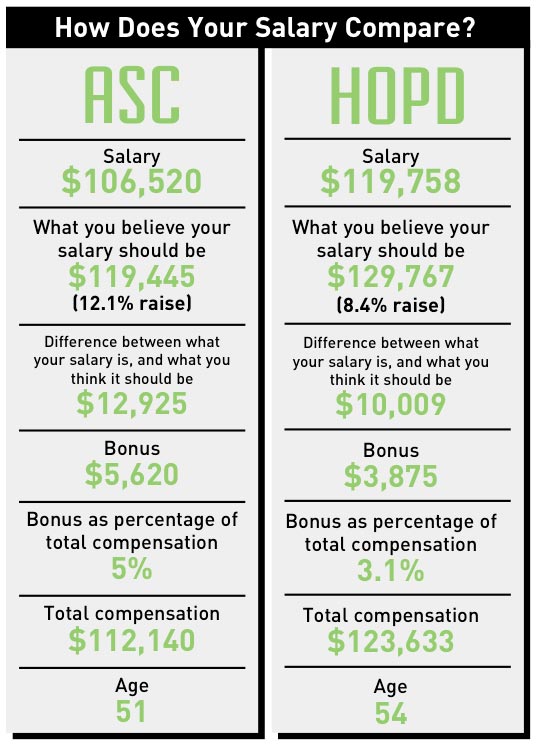
“If my salary were to be broken down per hour, I would likely make less than the other nurses who work for our facility,” says Andi Boren, BSN, RN, director of nursing at Surgery Center 121 in Plano, Texas. “However, I find the personal satisfaction in my position to be just as rewarding, if not more, as the financial compensation I receive.”
When you run today’s salaries through the U.S. government’s Consumer Price Index calculator, which is the closest thing to an official cost-of-living metric, they fall a bit short of what they should be, given the CPI increases between 2003 and 2019.
“I’ve been a nurse for almost 34 years and have been maxed out on my salary since 2015,” says one survey respondent. “I’m actually making less money because our benefits continue to increase every year, as do my deductibles and co-pays.”
Perhaps not surprisingly, about half of our more than 400 survey respondents feel their salaries are lagging behind those of their peers and that they’re worth considerably more. How much more? ASC leaders believe their salary should be $12,925 higher to $119,445 (12.1% increase) and HOPD leaders feel they deserve $10,009 more for a salary of $129,767 (8.4% increase).
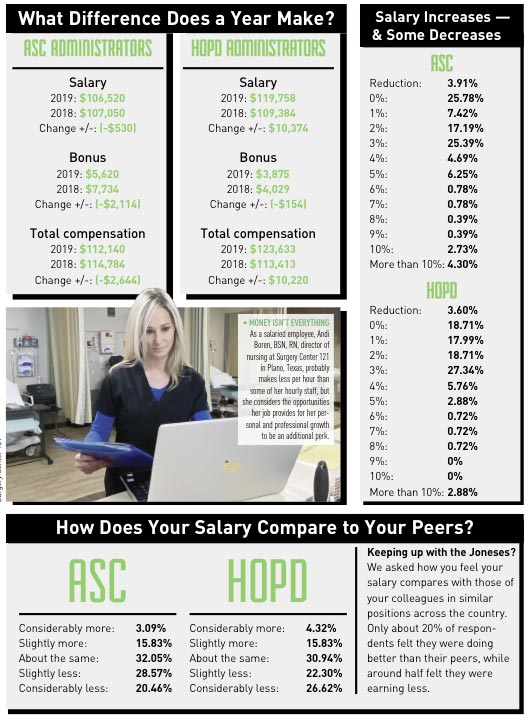
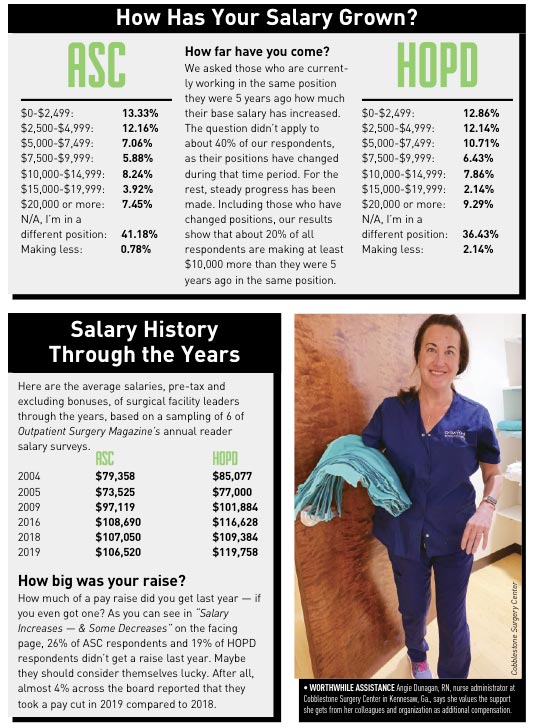
More troublesome findings from this year’s survey:
- ASC administrator salaries and total compensation were down slightly from last year’s, while HOPD administrator salaries and total compensation rose by more than $10,000.
- Bonuses were down slightly across the board.
- Salary increases were modest, with more than 4 out of 5 survey respondents getting a raise of 3% or less in 2019, and around 1 in 4 not getting a raise at all.
- Salary reviews were too generic, didn’t match up with job responsibilities, didn’t provide constructive feedback or had no impact on a pay raise.
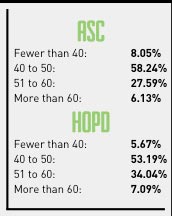
Surgical facility leaders are committed to their jobs, wear many hats and go the extra mile when needed — and you’re logging a heck of a lot of extra miles! So it’s no surprise that the work/life balance provided by the ideal of a 40-hour workweek, even in a facility with regular Monday through Friday business hours, can be difficult to achieve. The percentage of ASC administrators working 51 or more hours per week is almost 34%; for HOPD administrators, the number rises to more than 41%.
A lot of respondents, even though they work in same-day surgery centers, spoke of being engaged on some level with the job virtually 24/7, for better or worse. Some feel they’re overworked, doing the jobs of several people, or that their personal lives are taking a hit. Others speak of an underlying sense of duty.
“I work 50 hours a week, but that is my choice,” says Debbra Ukele, RN, BSN, director of nursing at Casper (Wyo.) Surgical Center. “I could work less, but I like to make sure everything is winding down before I leave for the day. I usually stay until the last patient is out of the OR. Sometimes I feel I can never be truly ‘off call.’ I feel very responsible for the overall functioning of the center.”
Perhaps our survey’s most unsettling finding was the widening gap between ASC and HOPD salaries. ASC administrators earned less across the board — salaries, bonuses and total compensation — in 2019 than they did in 2018. Meanwhile, HOPD administrators, who in 2018 earned slightly less than their ASC peers, gained more than $10,000 on top of what they earned in 2018. OSM
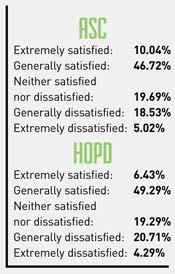
Do you feel you’re paid enough for everything you do? More than half of our survey’s respondents are satisfied with their compensation, considering the heavy demands placed upon them by their position. But about one-fourth expressed some level of dissatisfaction.
“I’m paid fairly for what my job responsibilities should be, although more often than not I have to take on additional duties due to being short-staffed,” says Samantha Hammond, MSN, RN, CNOR, nurse manager of surgical services at Tanner Medical Center/Villa Rica (Ga.).
Adds Renee Moreno, MSN, nurse administrator at Laredo (Texas) Laser & Surgery, “The compensation would be fine if I were just doing the job I was hired for.”
“For the amount of hours I put into my work, I took a pay cut when I went to salary from hourly,” says Rachel Piszczek, BSN, RN, CNOR, CAPA, director of nursing at The Surgery Center of Fairbanks (Alaska). “The last 6 months in my position, we’ve been so low-staffed that I’ve been filling the role of 3 other positions, along with my own.”

Let’s start with what our survey respondents dislike about their jobs. The usuals: managing staff, handling mountains of paperwork, heavy workloads with long hours, maintaining compliance with onerous and ever-changing rules and regulations, dealing with finances and contract negotiations, using outdated or insufficient technology, being short-staffed and other results of budget cuts, office politics, physicians who refuse to listen or adapt, and the never-ending struggle between controlling costs and providing the best patient care possible.
Managing staff was a commonly cited issue. “It’s mentally taxing to address staff members who are not getting along or pulling their weight,” says Debbra Ukele, RN, BSN, director of nursing at Casper (Wyo.) Surgical Center. “It takes a lot of time and energy to truly listen and understand each person’s point of view.”Linda Nelson, MSN, RN-BC, administrator at North Pinellas Surgery Center in Dunedin, Fla., laments organizational inertia: “When you’re trying to make changes that will overall benefit the facility and staff, and people are resistant because ‘we’ve always done it this way.’”
For Chris Blackburn, RN, BSN, CNOR, administrator at South Kansas City Surgicenter in Overland Park, Kan., it’s the heavy weight of responsibility: “The buck stops with me,” she says. “That can be kinda scary.”
Enough doom and gloom. The good stuff includes great relationships with staff, patients and physicians; the more-or-less predictable hours; scheduling flexibility; the ability to affect positive change and solve problems; diversity of tasks; growing patient volumes; and feeling challenged and inspired.
“I enjoy supporting the staff members,” says Lance Baldwin, MSN, RN, vice president of operations at Northwest Eye Surgeons in Seattle, Wash. “I hope that I’m providing a workplace that people enjoy working at. They spend the majority of their waking life at work, so it should be nice.”
Says Norma Bacon, administrator at New England Surgery Center in Beverly, Mass., “I’ve been here since the ASC was built. It is my ‘baby’ and watching it grow has been wonderful.”
For Pat Ontoun, BSN, RN, clinical manager of perioperative services at Physicians Adventist Surgery Center in Glendale, Calif., it’s about making a good situation better: “I enjoy making changes to the work environment that positively impact the working conditions of the staff and allow the center to run more efficiently.”
For Andi Boren, BSN, RN, director of nursing at Surgery Center 121 in Plano, Texas, the most rewarding aspect of her job is the never-ending opportunity for personal and professional growth. “I get to learn something new every day, sharpen my management skills, teach others, exercise a great deal of autonomy, utilize my problem-solving abilities and lead others in a mission that I am so passionate about,” she says.
.svg?sfvrsn=be606e78_3)
.svg?sfvrsn=56b2f850_5)